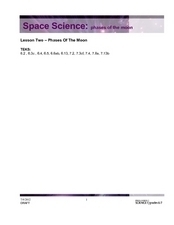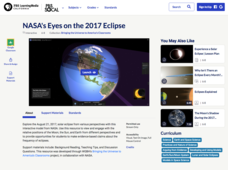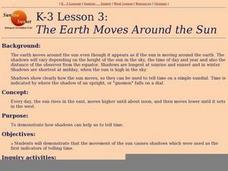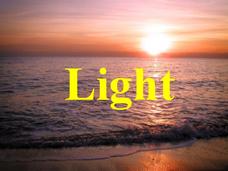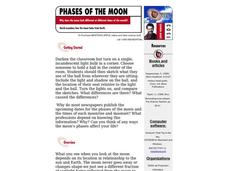University of Texas
Observing the Moon
Why does it look like there is a man on the moon? Why does the moon look different every night? These are the focus questions of a lesson that prompts class members to observe and record the nightly changes of Earth's natural...
Curated OER
Space Science: Phases of the Moon
Looking for a terrific lesson on the phases of the moon that has lots of good worksheets? With two excellent websites are embedded in the plan, the activity is sure to spark some interest in your astronomy unit. Some common...
K12 Reader
Phases of the Moon
Take one giant leap for mankind with a reading passage about the moon. Kids learn about the lunar cycle with context clues and reading comprehension questions, making it a good informational text for your language arts lesson.
North American Montessori Center
Sun and Moon Autumnal Equinox Activities
Two hands-on activities celebrate the sun and moon autumnal equinox. First, scholars create a cairn using a shoebox, flashlight, and drawing tools to view the sun's progression. Second, learners take to the kitchen to bake mooncakes...
K5 Learning
The Moon
Second graders read a short informational text passage about the moon and answer a series of questions based on what they read.
Curated OER
Modeling Shadows
Students demonstrate understanding of shadows by creating a physical model of concepts taught.
Curated OER
Water on the Moon!
In this moon worksheet, students read about the data collected from the Deep Impact/EPOXI and Cassini missions to the moon that have detected the presence of hydroxyl molecules under the moon's polar craters. Students solve 4 problems...
Curated OER
LRO Sees Apollo 11 on the Moon!
In this moon image worksheet, students determine the scale of an image taken by the LRO satellite of the Apollo 11 landing site. Students calculate the sun's angle at the time of the photograph using the shadow of the Lunar Lading...
BBC
Light and Shadows
Light is such an amazing thing! Elementary schoolers explore the wonderful world of light and shadow. The lesson is meant to be carried out on a whiteboard. Objects are placed in front of a light source, and learners must predict what...
PBS
NASA's Eyes on the 2017 Eclipse
How did the 2017 eclipse look in Los Angeles—or Chicago? Experience both views, plus many more, using a lesson from PBS's Space series for middle schoolers. Scholars follow the movements of the sun, moon, and Earth during the most recent...
Astronomical Society of the Pacific
Getting Ready for the All American Eclipse!
Give your pupils a front row seat at the biggest light show in the sky this year! In addition to admiring the total solar eclipse, young astronomers can explain the phenomenon with a little help from an inquiry-based lesson. The focus of...
School District No. 71
Adding Written Detail: Using Jane Yolen’s Owl Moon as a Mentor Text
Access your senses with a worksheet on sensory language. Based on Owl Moon by Jane Yolen, the worksheet prompts kids to find examples of each of the five senses, as well as phrases for inner emotion.
Curated OER
The Earth Moves Around the Sun
Young scholars demonstrate that the movement of the sun causes shadows which were used as the first indicators of telling time.
Curated OER
Sky 3: Modeling Shadows
Students will construct models to demonstrate their understanding of shadows. Many questions and suggestions for variants on the activities are presented to allow you to tailor this lesson to your particular needs. It is best to make the...
EngageNY
Making a Claim: Moon Shadow’s Point of View of the Immediate Aftermath
Body paragraphs are the building blocks of every essay. Pupils view and discuss a model essay using a rubric to evaluate one of its supporting paragraphs. Next, scholars use what they've learned to continue drafting their own literary...
EngageNY
How Far Away Is the Moon?
Does the space shuttle have an odometer? Maybe, but all that is needed to determine the distance to the moon is a little geometry! The lesson asks scholars to sketch the relationship of the Earth and moon using shadows of an eclipse....
Curated OER
Demonstrating Moon Phases
Third graders participate in a demonstration of the moon's phases. In this moon phase lesson, 3rd graders watch as the teacher demonstrates moon phases with a bright light and a Styrofoam ball. They answer questions associated with the...
Curated OER
Cut and Paste Moon Phases Activity
In this phases of the moon worksheet, students are given pictures of the phases of the moon and they cut them out and paste them to a diagram with the names of the phases. They answer questions about the moon, the phases and the rotation...
Curated OER
A Moon with a View
Third graders explore the rotation of Earth and the moon. In this solar system lesson plan, 3rd graders participate in an Earth and moon simulation in which part of the class "becomes" the sun, while other children represent the moon by...
Curated OER
Hello Sun, Goodnight Moon
Students become familiar with different times around the world through the reading of 9 O'clock Lullaby. In this Earth, sun, moon lesson, students recognize the movement of the Earth and the relationship to the sun and the...
Curated OER
Light
Here is a stellar slide show for illuminating middle schoolers' minds on the topic of light! An interactive slide allows viewers to sort light sources by whether or not they are man-made. More objects are displayed and learners discover...
Curated OER
Light at Night
Portraying accurate light in a chalk drawing can be difficult. This useful PowerPoint provides fantastic guidelines to achieve good lighting perspective in a drawing. Three photo examples are provides on slides six, eight, and ten, to...
EngageNY
Reading for Gist and Analyzing Point of View: Moon Shadow
Character analysis isn't always earth-shattering. Using a graphic organizer, pupils analyze Moon Shadow's point of view following the earthquake in Laurence Yep's Dragonwings. Also, scholars co-create an anchor chart showing the...
Curated OER
Phases of the Moon
Students explore why when you examine the moon depends on its location in relationship to the sun and Earth. The moon never goes away or changes shape-we just see a different fraction of sunlight being reflected from the moon to Earth.



